Cambodia has witnessed significant growth in its commercial property market in recent years. With a stable political climate, increasing foreign investment, and a young, growing population, the country has become an attractive destination for both local and international businesses looking to expand their operations.
As Cambodia continues to experience economic growth and urbanization, the demand for diverse commercial properties has also increased, ranging from office spaces and retail outlets to hotels and warehouses.
In this article, we will dive into the different types of commercial properties in Cambodia.
Office Spaces
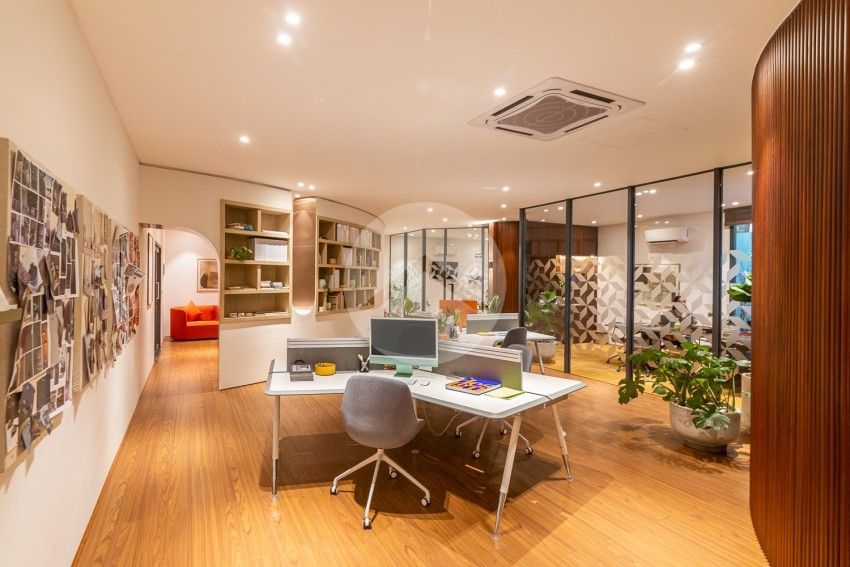
Strata Title Office For Sale in Odom Tower, Tonle Bassac, Phnom Penh
In Cambodia, office spaces can be found in various forms, catering to the diverse needs of businesses. Traditional office buildings offer an established environment, often located in central business districts and equipped with essential facilities. These office spaces are suitable for larger corporations or businesses seeking a more formal and professional setting.
On the other hand, co-working spaces and serviced offices have gained popularity in Cambodia, particularly among startups, freelancers, and small businesses. These spaces provide flexibility in terms of rental agreements, size, and shared amenities, fostering a collaborative and dynamic work atmosphere.
Factors to Consider When Choosing an Office Space
| Factors | Considerations |
| Location | – Visibility and accessibility |
| – Proximity to transportation hubs | |
| – Nearby clients and suppliers | |
| Size and layout | – Team requirements and future growth |
| – Space customization options | |
| – Common areas and private offices | |
| Amenities and facilities | – High-speed internet |
| – Meeting rooms and conference facilities | |
| – Parking and security | |
| Lease terms and costs | – Rental agreement duration |
| – Financial capabilities and growth projections | |
| – Additional expenses (maintenance fees, utilities) |
Retail Spaces
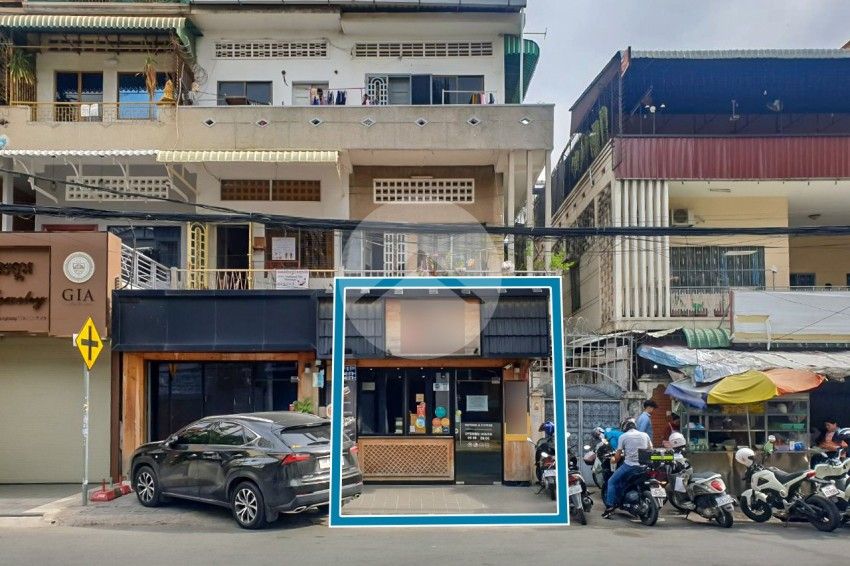
80 Sqm Retail Space For Lease in BKK1, Phnom Penh
In Cambodia’s thriving retail landscape, businesses can choose from various options to establish their presence. Shopping malls and department stores are popular due to high foot traffic and diverse amenities, catering to a wide clientele and benefiting from the mall’s marketing efforts.
In contrast, street-level retail spaces offer a unique opportunity for businesses to engage with customers in busy commercial areas. These spaces have lower overhead costs and increased visibility, attracting a loyal customer base through personalized shopping experiences.
Pop-up stores and markets provide an avenue for businesses to test the market or capitalize on seasonal trends. These temporary retail spaces encourage immediate purchases due to urgency and exclusivity and allow businesses to assess customer interest and gather feedback before committing to long-term retail space.
Factors to Consider When Choosing a Retail Space
| Factors | Considerations |
| Foot Traffic and Visibility | – High-volume pedestrian areas |
| – Storefront exposure and signage | |
| Demographics of Target Customers | – Age, income, and lifestyle preferences |
| – Proximity to target customer base | |
| Competition and Complementary Businesses | – Existing competitors in the area |
| – Presence of businesses that complement your offering | |
| Lease Terms and Costs | – Rental agreement duration |
| – Financial capabilities and growth projections | |
| – Additional expenses (maintenance fees |
Commercial Villa and Shophouse
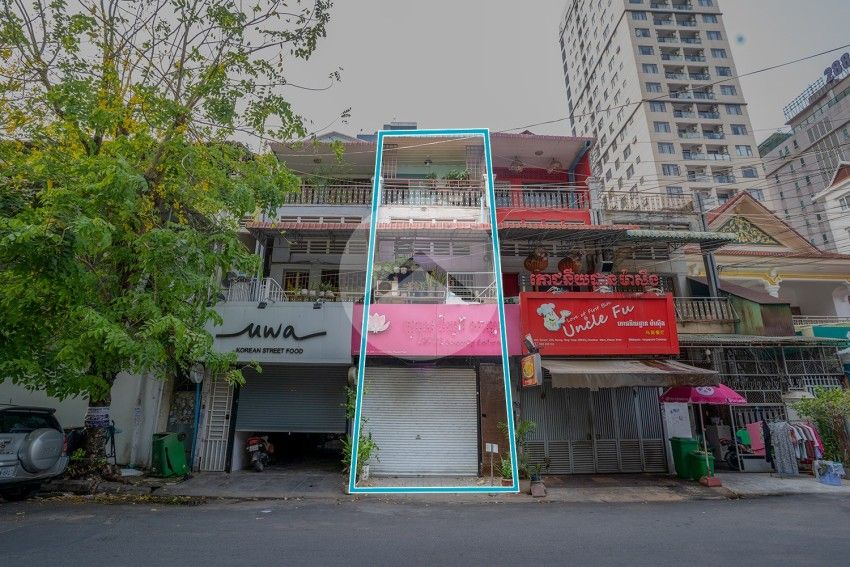
276 Sqm Commercial Shophouse For Rent in BKK1, Phnom Penh
Commercial villas and shophouses are unique types of commercial properties that are commonly found in urban areas. They are often two or three-story buildings that are designed with a storefront on the ground floor and living quarters on the upper floors.
Uses for Commercial Villas and Shophouses
There are many possible uses for commercial villas and shophouses. Here are three common ones:
- Retail: The ground floor storefront can be used for retail purposes such as clothing stores, gift shops, or specialty stores.
- Office: The upper floors can be used for offices or workspaces. This is especially useful for small businesses that need a storefront and workspace in the same location.
- F&B outlets: The ground floor storefront can be used for restaurants, cafes, and other food and beverage outlets. This is a popular use for commercial villas and shophouses in tourist areas.
Factors to Consider When Choosing a Villa or Shophouse
| Factors | Considerations |
| Location and Accessibility | – Proximity to target customers and suppliers |
| – Public transportation access and parking availability | |
| Architectural Style and Condition | – Aesthetic appeal and suitability for business operations |
| – Renovation or restoration requirements | |
| Regulatory and Zoning Restrictions | – Compliance with local zoning and land use regulations |
| – Potential restrictions on business operations (e.g., noise, hours of operation) | |
| Lease Terms and Costs | – Rental agreement duration |
| – Financial capabilities and growth projections | |
| – Additional expenses (maintenance fees, utilities, insurance) |
Hotel and Guesthouse
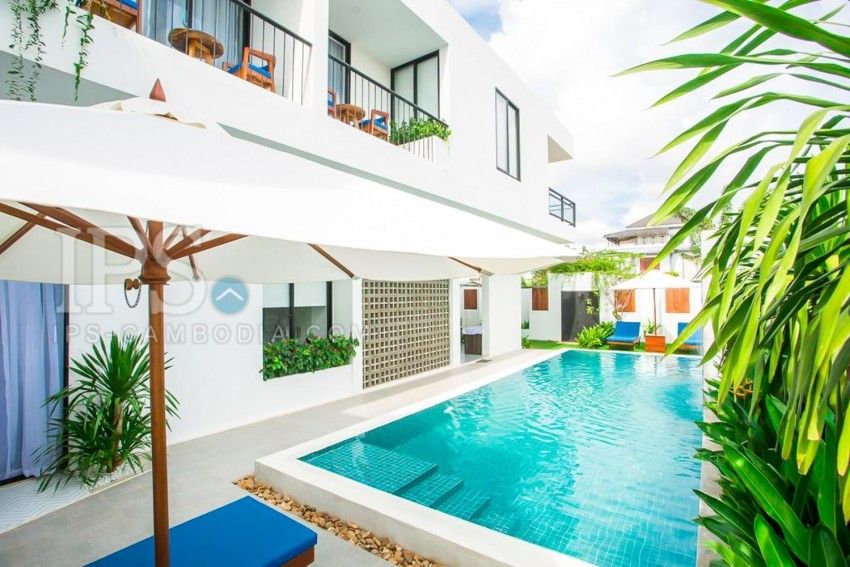
7 Bedroom Boutique Hotel For Sale in Svay Dangkum, Siem Reap
Boutique hotels and guesthouses are smaller, more intimate lodging options that cater to guests seeking a unique and personalized experience. They typically have fewer rooms and offer a high level of attention to detail, design, and service.
These establishments often feature themed or individually styled rooms, a strong focus on local culture, and an atmosphere of exclusivity. Boutique hotels and guesthouses are popular choices for travelers who want a memorable stay that offers a local flavor and a personalized touch.
In contrast to boutique hotels and guesthouses, larger hotel developments provide a more extensive range of accommodations and services. They usually have a greater number of rooms, often accompanied by amenities such as on-site restaurants, bars, pools, fitness centers, and conference facilities.
Larger hotel developments cater to a wider range of guests, from business travelers to families and group bookings. These establishments often belong to well-known hotel chains, providing a consistent level of service and quality that guests have come to expect.
While they may lack the intimate charm of boutique hotels, larger hotel developments offer a comprehensive service package for travelers seeking convenience and varied amenities.
Factors to Consider When Investing in a Hotel or Guesthouse
| Factors | Considerations |
| Location and Tourist Attractions | – Proximity to popular tourist sites and attractions |
| – Accessibility to transportation and local amenities | |
| Target Market and Competition | – Understanding the demographics and preferences of potential guests |
| – Assessing the competition in the area and identifying niche opportunities | |
| Operational Requirements and Management | – Staffing needs and hiring experienced personnel |
| – Implementing efficient management systems and processes | |
| – Developing a solid marketing strategy to attract guests | |
| Licensing and Regulations | – Obtaining necessary permits and licenses for operation |
| – Complying with local health, safety, and environmental regulations | |
| – Adhering to industry-specific requirements and standards |
READ ALSO: Benefits of Investing in Commercial Property in Cambodia
Commercial Land or Development
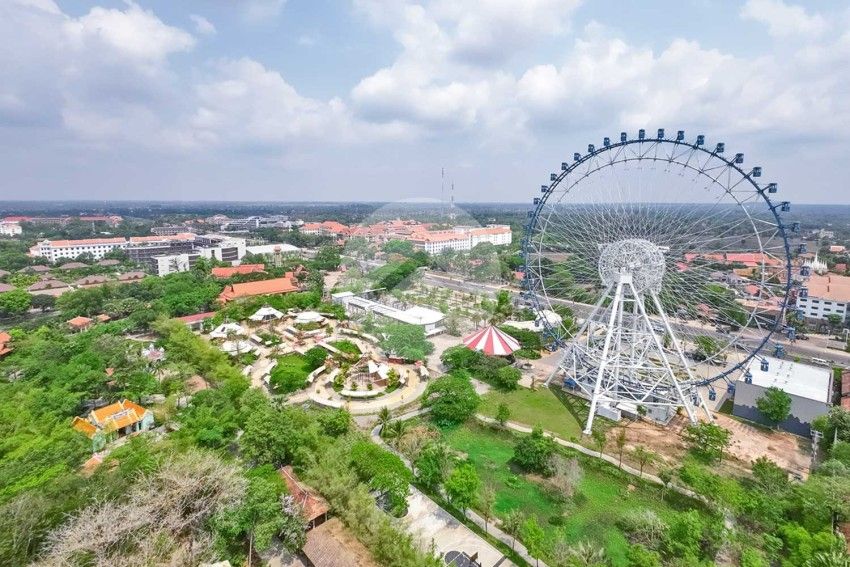
Commercial Property For Rent in Svay Dangkum, Siem Reap
Commercial land represents a significant opportunity for developers and investors looking to capitalize on the potential for growth and value appreciation.
Investing in land for development can provide flexibility in determining the best use for the property, whether it be for constructing new buildings, redeveloping existing structures, or holding onto the land as a long-term investment. The value of commercial land is often influenced by factors such as location, zoning, and nearby infrastructure projects.
Factors to Consider When Purchasing Commercial Land
| Factors | Considerations |
| Location and Accessibility | – Proximity to transportation hubs and infrastructure |
| – Easy access to target markets and local amenities | |
| Land Title and Ownership | – Ensuring the property has a clear and legitimate title |
| – Understanding any liens, easements, or encumbrances affecting the property | |
| Development Potential and Restrictions | – Familiarity with zoning regulations and allowable uses |
| – Identifying any environmental or structural constraints | |
| Market Trends and Future Growth Prospects | – Assessing current market conditions and local economic trends |
| – Evaluating the potential for long-term growth and development in the area |
Warehouse or Factory
Types of Warehouses and Factories
- Distribution Centers: These warehouses store and manage inventory for businesses, facilitating the distribution of goods to various locations. Distribution centers often feature advanced logistics and material handling systems to optimize efficiency.
- Cold Storage Warehouses: Specifically designed to store perishable goods, such as food and pharmaceuticals, these warehouses maintain a controlled temperature and humidity environment to ensure product quality and safety.
- Manufacturing Facilities: Factories dedicated to the production of goods, these facilities often include specialized machinery and equipment for various manufacturing processes, such as assembly lines, fabrication, or packaging.
- Data Centers: These warehouses store and manage large amounts of digital information and computer systems. Data centers require advanced infrastructure, such as cooling systems and backup power sources, to maintain optimal performance and data security.
- Flex Warehouses: These versatile spaces combine office, storage, and light manufacturing capabilities under one roof. Flex warehouses cater to businesses requiring a mix of functions, such as research and development, production, or showroom space.
- E-commerce Fulfillment Centers: These warehouses are designed to handle the storage, packaging, and shipping of goods for online retailers. They typically feature advanced inventory management systems and material handling equipment to facilitate fast and accurate order fulfillment.
Factors to Consider When Selecting a Warehouse or Factory
| Factors | Considerations |
| Location and Transportation Access | – Proximity to major transportation hubs and networks (highways, ports, airports, etc.) |
| – Accessibility for employees, suppliers, and customers | |
| Size and Layout of the Facility | – Adequate space for current and future storage, production, or operational needs |
| – Efficient layout for inventory management, material handling, and workflow | |
| Utilities and Infrastructure | – Availability of essential utilities (electricity, water, gas, etc.) |
| – Adequate IT, communication, and security infrastructure | |
| Regulatory and Zoning Restrictions | – Compliance with local zoning regulations and allowable uses |
| – Understanding any environmental, safety, or building code restrictions or requirements |
Conclusion
To achieve success in Cambodia’s dynamic business landscape, it is crucial to find a commercial property that aligns with your objectives and operational requirements. By carefully considering factors such as location, size and layout, utilities and infrastructure, and regulatory compliance, you can identify the most appropriate type of property for your business.
By selecting the right type of commercial property in Cambodia, you can enhance your company’s efficiency, productivity, and overall competitiveness in the expanding Southeast Asian market.
Take the first step towards finding the perfect commercial property for your business plan in Cambodia!
Whether you’re looking to lease or buy, let our team of commercial experts connect you with the right property. Contact us here or via Telegram to get started!

